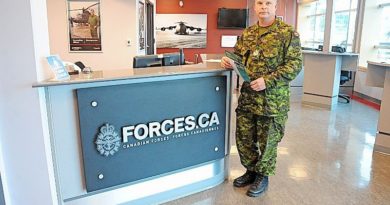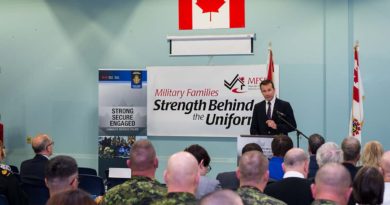The Princess Louise Fusiliers Diversity Soldier Experience Program
by Second Lieutenant Ahmed Elkar and Captain Michael Gray
Background
In the fall of 2020, the Commanding Officer of the Princess Louise Fusiliers (PLF), Lieutenant-Colonel (LCol) Barry Pitcher, launched a new initiative called the Diversity Soldier Experience Program (DSEP). The idea for this came following a summer basic training graduation which LCol Pitcher attended as reviewing officer. According to LCol Pitcher “Looking out at the soldiers on parade that day, I felt that what I was seeing wasn’t a true representation of the community we serve.” A working group was formed and the team came to the conclusion that to effect true change and promote inclusion within the Primary Reserve, there needed to be synergy from within. In other words, DSEP would be designed to educate ranks through the medium of ‘shared experiences.’ As such, it was decided that DSEP would focus on key stakeholder groups to introduce soldiers to the societal diversity within Canada and the Canadian Armed Forces (CAF) in particular.
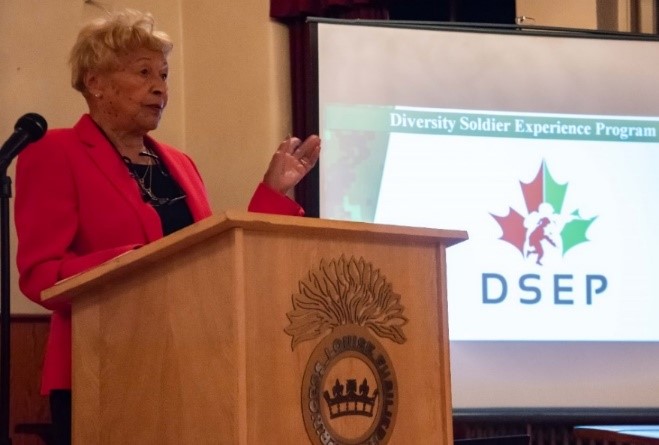
Halifax Armouries, 15 October, 2020
Photo: Corporal Bradley Upshall, 36 Canadian Brigade Group Public Affairs
The initiative template was then designed by the unit working group to be encapsulated in an informal course format for Primary Reserve members to attend both in-person and through an online portal. Given pandemic restrictions, the course had to be flexible enough to shift online at a moment’s notice. The unit formed a small cadre to teach this; this was led by Second Lieutenant Jerome Downey who conceptualized key teaching points and experiences into deliverable course content. The course focused on three modules spanning six months delivered in both classroom and online mediums. Each session was then further divided into a historical education piece followed by a special guest speaker chosen by the focus group. The DSEP subject areas for the three modules were: Role of Women in the CAF, Indigenous Canadians in the CAF and Black Canadians in the CAF.
Women in the Canadian Armed Forces
This first module covered the history of how women have contributed during wartime and peacekeeping service, and how women continue to serve our country today. The course had the pleasure of hosting many special guest speakers over these first sessions at the Armouries in Halifax, Nova Scotia. One such speaker was Marlene Clyke, Corporal (retired), who was one of the first Black women to enroll in the Canadian Women’s Army Corps. She is a respected advocate in her community and a pioneer for Black Canadian women in uniform. She spoke proudly of her time serving in the army beginning at age of 17, and of how her experiences in the military shaped her as a present-day community leader. As October was Women’s history month, this coincided nicely with these initial presentations. Course attendees did various roundtables highlighting the achievements of women and their important contributions on the world stage. One of the key themes for module one was the emphasis on the fact that Canada was one of the first countries to allow women to serve in the military and that it now boasts one of the highest proportions of women in uniform. Another important takeaway was the lesson on how Canada was one of the first countries to demonstrate women as fully capable (physically, mentally and emotionally) of serving within combat arms units. The course had the honour of hearing from LCol Eleanor Taylor in this regard. LCol Taylor shared her personal experiences of overcoming adversity and breaking barriers as a female infantry company commander in Afghanistan.
Indigenous Members of the Canadian Armed Forces
The DSEP program continued throughout December of 2020 with a module on Indigenous, Metis and Inuit Canadians in the CAF. These lessons offered the opportunity for the candidates to be immersed in the indigenous culture. In doing so, they learned of the historical evolution of treaty rights and the terrible chapter of residential schools and the lasting impact it is has to this day. The CAF ‘Black Bear’ program was highlighted as an ongoing best practice in this particular module. How this landmark course leverages connections to communities and enables a pipeline for Indigenous youth to gain a career in the CAF were key takeaways. In this regard, guest speakers included Honourary Colonel Dr Donald Julien, Member of the Order of Canada, Executive Director of the Confederacy of Mainland Mi’kmaw, and John Sylliboy, Executive Director at the Wabanaki Two-Spirit Alliance. One notable guest speaker near the end of this interactive module was Honorary Captain(N) Debbie Eisan. As part of a collaborative in-person event for the course, she attended in her ceremonial dress and sang the Mi’kmaw Honour Song for all the participants. Debbie offered insight into the important connections of people and territory, and taught the values of Mi’kmaw cultural competencies.
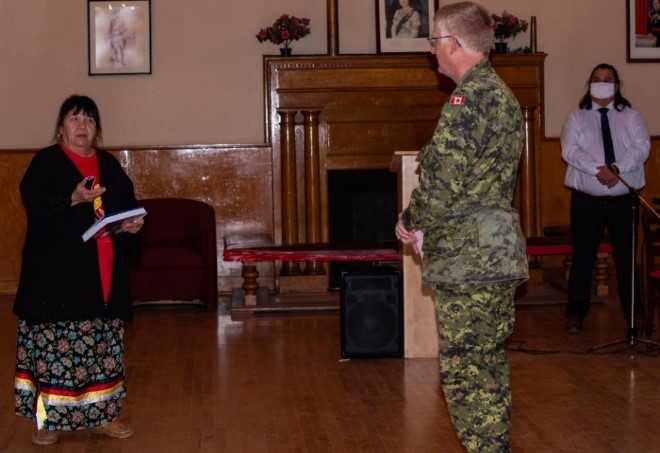
and Richard Taylor (L to R)
Halifax Armouries, 22 October 2020
Photo: Corporal Bradley Upshall, 36 Canadian Brigade Group Public Affairs
Black Canadians in the Canadian Armed Forces
The final module on Black Canadians in February of 2021 coincided with Black History Month. Course participants were exposed to the history of Black and African Canadians in the Canadian Armed Forces. One of the first key takeaways for this module was the importance of recognizing No. 2 Construction Battalion, a First World War all-Black Canadian unit initially based out of the Pictou area of Nova Scotia. The significance of highlighting this particular unit was the fact that they were a segregated unit and that despite volunteering to fight overseas, they were not allowed to engage in frontline combat. The course learned that despite facing severe limitations on recruitment and wartime employment, they would go on to distinguish themselves as a premiere construction unit deployed throughout Europe. Guest speakers included Dr Kirrily Freeman, Associate Professor, Saint Mary’s University and Sergeant Craig Smith, currently in charge of the Nova Scotia RCMP Crime Prevention & Victim Services. Sergeant Smith, an accomplished author of various publications including the book “You Had Better be Black by Six a.m.,” focused on his own struggles with bias and racism in law enforcement – many parallels evolved for discussion of life in military uniform and the concept of unconscious bias.
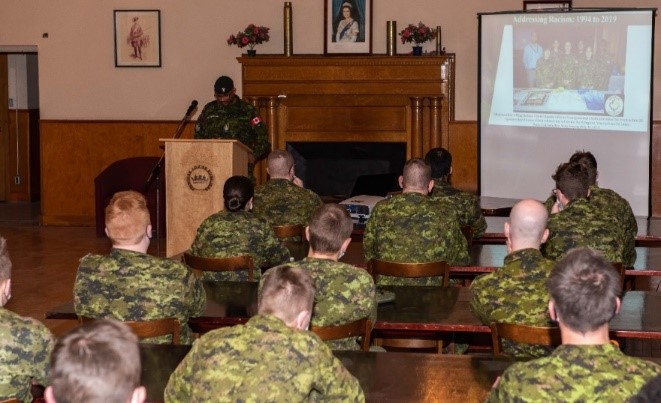
Halifax Armouries, 21 January 2021
Photo: Corporal Bradley Upshall, 36 Canadian Brigade Group Public Affairs
The final session in this module was an in-person session at the Halifax Armouries with two guest speakers, Chief Warrant Officer (retired) Cy Clayton, MMM, CD and Mr Wayn Hamilton, Chief Executive Officer of African Nova Scotia Affairs (ANSA). Mr Clayton discussed his forty year career with the Canadian Armed Forces, his many encounters with racism along the way and how those acts were contrasted by experiences with great leaders who promoted his career. Mr Clayton highlighted that if it were not for leaders that ‘went against the grain’ he would never have been entrusted with key roles such as being the first black Base Chief Warrant Officer. Wayn Hamilton described the role of ANSA and all the ways its dedicated service to African Nova Scotians is promoting new community and educational opportunities. As a part of Mr. Hamilton’s keynote presentation, he shared a personal message from the Honourable Tony Ince, Minister of African Nova Scotian Affairs, as follows:
“The Diversity Soldier Experience Program is designed to promote issues of diversity and workplace equity. This program will give each of you, a better understanding of the histories, accomplishments, and challenges faced by people of African descent, Indigenous peoples, and other equity-seeking groups.”
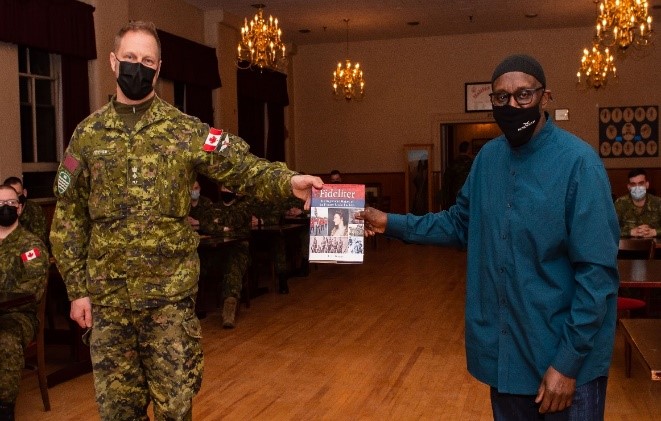
at the final DSEP session
Halifax Armouries, North Park Street, Halifax, 25 February 2021
Photo: Corporal Bradley Upshall, 36 Canadian Brigade Group Public Affairs
The Way Ahead
On conclusion of this new and innovative program, all participants received a certificate and symbolic patch that highlighted their 6 month journey of interactive and immersive learning. Based on feedback from students, instructors and guests, the DSEP pilot program has been a resounding success. There is no doubt that the course met the aim of creating that synergy within, and thereby stimulated much needed discussions on diversity in the CAF. Following a comprehensive review on the conclusion of DSEP in March of 2021, the new plan for the course is for the modules to be expanded to include historical site visits and interactive community events. This course is also set to be shared across 36 Brigade and 5 Canadian Division in the fall of 2021 such that all units can avail of the opportunity of this shared experience in the spirit of inclusivity.
Second Lieutenant Ahmed Elkar and Captain Michael Gray are members of the Princess Louise Fusiliers. This work is the sole opinion of the authors and does not necessarily represent the views of the Canadian Department of National Defence, the Canadian Armed Forces or the Royal United Services Institute of Nova Scotia. The authors may be contacted by webmail.
A PDF of this paper is available here.



